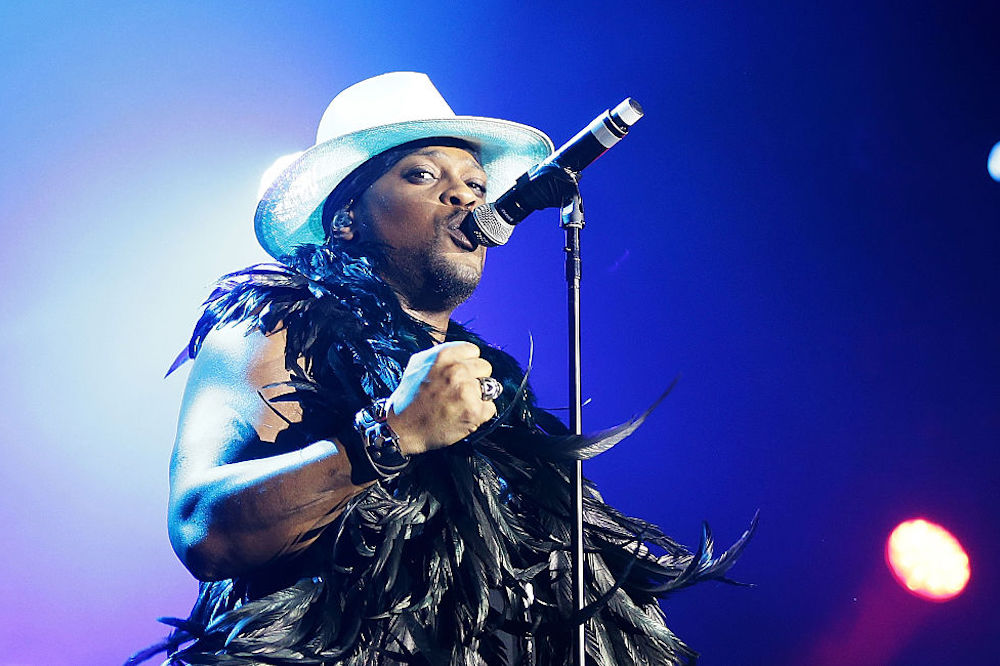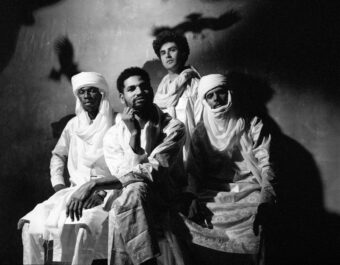Release Date: December 16, 2014
Label: RCA
When D’Angelo sings, “All we wanted was a chance to talk / ‘Stead we only got outlined in chalk” on his long-awaited third album, we can’t help but think about Trayvon Martin, Michael Brown, and Eric Garner. But he probably wrote that couplet four years ago — Questlove’s been hyping that song, “The Charade,” in interviews since 2011. More to the point, it could’ve been sung in 1971 by Marvin Gaye on What’s Going On. Or by Sly on the Family Stone’s answer album, There’s a Riot Goin’ On. Old Jim Crow isn’t that old and New Jim Crow isn’t that new. Later on the new Black Messiah, our host muses that he’s “traveling at the speed of light and then, at the same time I’m in the same spot too.” It could be a meditation on quantum physics, sure, but it’s about this discussion too: D’s in the same room, locked into the same rhythm, making his inimitably rich and rare music about the same pain and gain. And his Vanguard are already in full swing when you hit play. The music just picks up — none of the niceties, all the nastiness — as if to say, “This conversation never stopped. Where you been?”
When Black Messiah arrives, there is no fanfare of horns. No hyped statement of purpose or musical parting of the clouds. What we get is a flurry of siren-like guitar disturbance, an errant bass slap, and panning handclaps crossing jerky drums. The man’s voice is multitudinous and alien. You reel amidst the disorientation of an opening track called “Ain’t That Easy.” You try to make sense of it, buck against its oddness, then give up and relax into the pocket of a perfect groove that was already there. Voodoo came out in 2000. That’s 14 years that’ve passed without a sermon from the neo-soul “savior,” as Questo’s dubbed him (or if you prefer, “R&B Jesus”). But an eternity in the music business is a blink in human progress. Love and faith are as confusing today as they were when we first heard “Devil’s Pie.”
//www.youtube.com/embed/mVsQwJfWzoI
So is Black Messiah a protest album? There’s politics aplenty, but you won’t find much that easily reduces to slogans, nor an acoustic strum for a sit-in. For one, D’s words are rarely legible. Amidst these wild, often dissonant soundscapes, his voice is a small vessel in a big sea — packed with import (the lyric book weighs a ton), but often presented as a note or a beat, or otherwise turned into a pile of voices singing in uneven unison à la the Funk-Soul Eccentric archetype laid down by George Clinton. Whether this is an intentional refutation of frontman-hood or not — lord knows D’s struggled with the spotlight — it’s frustrating if you’re straining to hear a message. But all that multi-tracking, mumbling, and moaning also reflects the frustration back at the listener. It’s our own everyday inner monologue, overdriven by general confusion, moral dilemma, anger, and ennui. We are murky legion.
There’s a stagnating pessimism here. On the opener, D’Angelo imparts, “Won’t believe all the things you have to sacrifice, just to get peace of mind / You take what they give as if it did suffice, still it’s just a waste of time.” The shambolic intro of “1000 Deaths,” samples two Black Panthers attacking institutions — public displays of strength in the face of an amorphous enemy. But seconds later, D sings from the POV of a soldier who can’t talk himself into charging over the hill to fight a specific battle. Similarly, the glistening “Till It’s Done (Tutu)” paints global warming as part of a bigger scene where “tragedy flows unbound,” before asking point-blank: “Do we even care?” The menace is aural too: “Deaths” sounds like Jimi Hendrix using his guitar to fend off a steam engine full of possessed passengers, while “Tutu” wends to a seasick lilt. Black Messiah has dozens of false starts, short stops, jagged breaks, and backmasked bits. Everything is a little warped. But somehow, the music never falls out of the pocket. And in that commitment to upholding the groove, we find warmth and evidence that we’re still moving forward despite the assault on our senses.
//www.youtube.com/embed/lZoxdPGu_4E
As on Brown Sugar in 1995 — ahem, “Shit, Damn, Motherfucker” — romance is a thorny matter too. Songs like “Sugah Daddy” and “Really Love” lie next to one another on the track list, respectively portraying a conniving seductress who needs a spanking (over a lean doo-wop joint), and a treasured partner who ought to be cherished (this one fat with Spanish guitar and florid harp). By presenting these as opposites, Black Messiah illustrates the push/pull between the wholesome affection we all agree we deserve, and the dovetailing desires that we guilt each other about. For D, it’s a gap too far to bridge. The LP finds a little peace with the hopeful, Prince-ly “Prayer,” which makes space for a promising relationship on “Betray My Heart.” But love walks out a song later, to the whistling stoop-folk of “The Door,” leaving our hero alone with his thoughts. Which are pretty self-aware: “Say if you’re wondering about the shape I’m in / I hope it ain’t my abdomen that you’re referring to.”
Because what’s a serious conversation without some relief? Dark though it may be, the music itself invites repeated listens and rewards with serious loveliness. And it’s worth noting that D and his crew — ?uesto, Q-Tip, Roy Hargrove, co-lyricist Kendra Foster, bassist Pino Palladino, drummer James Gadson, and engineer Russ Elevado, among others to be named — managed to make a record as virtuosic and sonically adventurous as Kanye West’s Yeezus and Flying Lotus’ You’re Dead! using an analog approach. Black Messiah is both ancient and fresh — a surging mass of old blues and new soul built from classic thought and rebel spirit, unending angst and beautiful struggle, sunshine and moonlight and cynicism and sex and fighting and loving and losing and praying and cussing and hating and hoping and, oh what the hell:
ALL! HAIL! D’ANGELO! THE BL—
But wait.
“The title is about all of us,” D wrote in a pamphlet handed out at a listening session for this LP. “It’s not about praising one charismatic leader, but celebrating thousands of them. It’s a feeling that, collectively, we are all that leader.” In the same note, he shouts out Ferguson, Egypt, and Occupy — events that inform these songs whether or not their stories were literally written into the narrative. Because the conversation keeps going and progress isn’t measured in album cycles.





